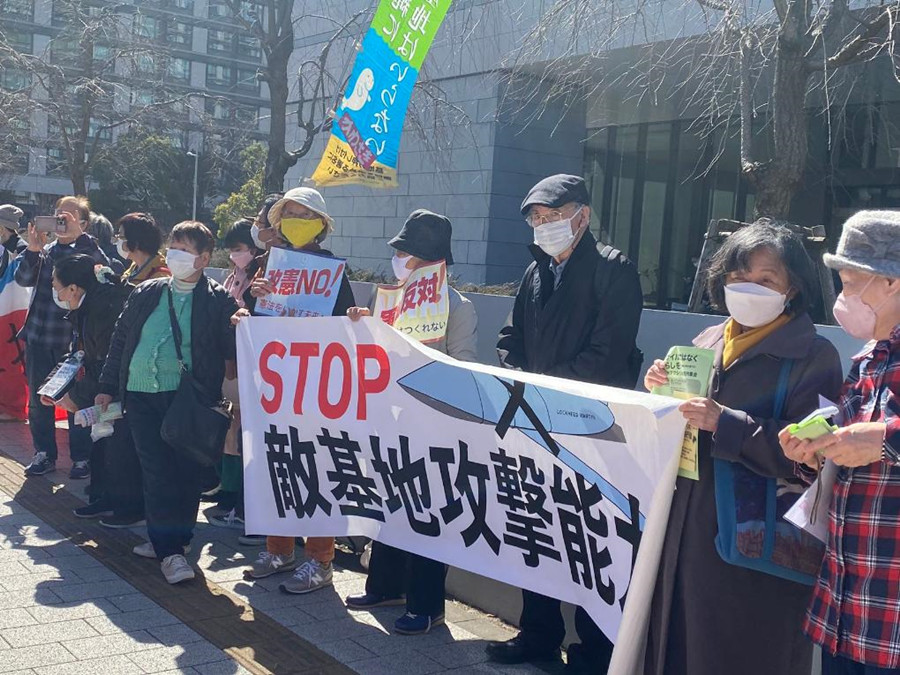
Japanese people hold signs to protest the high defense budget passed by the Japanese House of Representatives in Tokyo, Japan on February 28.
The news of Japan's decision to export weapons with lethal capabilities to the US has sparked widespread concerns. On December 27, Russian Foreign Ministry spokesperson Maria Zakharova stated that Japan's approval of the re-export of Patriot interceptor missiles to the US would have negative consequences for global and regional security. Chinese Foreign Ministry spokesperson Mao Ning urged Japan to earnestly respect the security concerns of neighboring countries and reflect on its history of aggression. The statements from neighboring countries are worth Japan's careful consideration. Japan should realize that exporting lethal weapons to the US is playing with fire.
Lifting the ban on the export of lethal weapons is the latest move by Japan to gradually loosen its security restrictions. On December 22, the Japanese government amended the Three Principles on Transfer of Defense Equipment and Technology and its implementation guidelines. The focus of this policy change is to allow Japan to export completed weapons it produces and assembles to authorized countries that grant Japan a "production permit."
Moreover, with consent from Japan, these completed weapons can be exported by the authorized countries to third countries, excluding countries currently engaged in combat. On the same day, the Japanese government decided to export the domestically produced Patriot Advanced Capability-3 land-based intercept missiles to the US.
Nihon Keizai Shimbun reported that the resale of Patriot missiles to the US is the first export of completed lethal weapons to other countries under the Three Principles on Transfer of Defense Equipment and Technology. The Asahi Shimbun reported that "It was so arbitrarily changed without national debate and this kind of decision made in a 'secret room' meeting cannot be widely recognized by the people!" Professor Hideki Uemura of Ryutsu Keizai University, who specializes in security policy, said that the direct consequence of this major revision is to turn Japanese companies into arsenals that support US defense policies.
Gradually loosening security restrictions is a dangerous move against Japan's pacifist constitution. After World War II, as a defeated nation, Japan enacted a pacifist constitution. However, right-wing forces in Japan have never given up their dreams of making Japan "a political power" and "a military power." Japan's decision to re-export Patriot missiles to the US undermines the restrictions on Japan's military capabilities set by the pacifist constitution. On the one hand, Japan is likely to gradually expand the scale and target countries of completed weapons exports, turning itself into a part of the global weapons supply market.
Mainichi Shimbun analyzed that the impression given by the re-export of Patriot missiles to the US is that Japan is entering an era where it assumes a part of the international arms supply network. On the other hand, Japan is likely to become more involved in regional conflicts. Although the Japanese government emphasizes that authorized countries cannot export weapons manufactured in Japan to a third country currently engaged in combat without Japan's consent, there are concerns that Japan indirectly fuels conflicts by supplementing the US arsenal. Miho Aoi, professor of law at Gakushuin University in Japan, said that Japan's pacifist constitution advocates pacifism and does not encourage international disputes, but this revision goes against the spirit of the Constitution.
Pursuing the breakthrough of military development will only harm itself and others. Japan's attempt to return to its militaristic path by gradually loosening security restrictions is fundamentally against its own interests. Only by adhering to the path of peaceful development can Japan truly promote its prosperity. Before World War II, Japan reached a point of no return under the militarization policy. Historical experience repeatedly proves that a country's prosperity and development depend on a peaceful and stable surrounding environment. The wars of aggression initiated by Japanese militarism brought profound disasters to countries and regions, especially some Asian nations. Japan’s heading down the irreversible path of militarism made most Japanese people become victims of war. Japan should deeply reflect on its history of aggression.
Reckless actions will lead to self-destruction. Japan should learn from history, earnestly adhere to its pacifist constitution, develop friendly relations with neighboring countries and regions, and earn the trust of Asian neighbors and the international community through concrete actions. This is Japan's most important security guarantee and the right path it should take.
Editor's note: Originally published on haiwainet.cn, this article is translated from Chinese into English and edited by the China Military Online. The information and opinions in this article do not necessarily reflect the views of eng.chinamil.com.cn.













